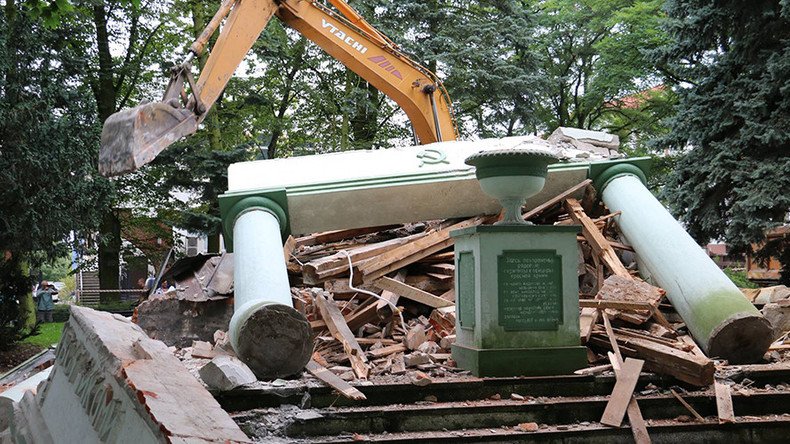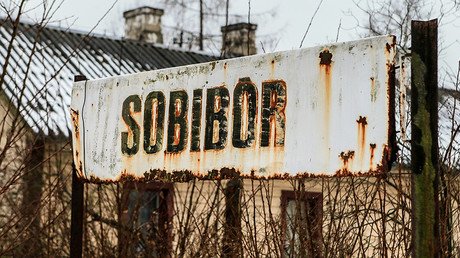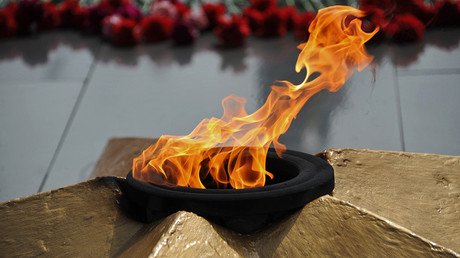‘Akin to barbarity’: Moscow furious over demolition of monument to Red Army soldiers in Poland

Russia has expressed its outrage at the bulldozing of a mausoleum housing the remains of dozens of Soviet soldiers who fell battling to free Poland from Nazi German occupation, calling the move an act of vandalism that violates bilateral agreements.
It took less than 20 minutes for the Polish authorities to raze the monument, built by the Red Army in 1945 in the Polish town of Trzcianka in memory of 56 Soviet soldiers who gave their lives on the battlefield.
Video of the demolition posted by Adam Bogrycewicz shows heavy machinery being used to demolish the war memorial.
Responding to what it described as a sacrilegious “act of vandalism,” Russia’s Foreign Ministry said that the demolition is “unacceptable in terms of existing inter-state and inter-governmental documents” relating to the preservation of the memory and burial sites of victims of war and repression, adding that the Polish government “was fully aware” of Moscow’s staunch objection to the removal.
“We consider this outrageous incident an illustration and direct consequence of the Polish government’s anti-Russian policy in the memorial field among others,” the ministry said in a statement on Saturday, adding that lack of respect to “the memory of the war and its heroes” displayed by Poland is “akin to barbarity.”
Poland has twice applied to the Russian embassy in Poland over the issue of the removal, but was unable to provide evidence that there were no remains of Russian soldiers in the mass grave, according to Aleksey Fomichev, Head of the Russian Defense Ministry military commemorative mission in Poland.
“Pursuant to all documents there are remains [in the mass grave]; there are no papers on exhumation or reburial,” Fomichev said, as cited by TASS.
READ MORE: Germany rejects Polish threat to demand WWII reparations
Fomichev revealed that the Russian delegation and the Polish local authorities had discussed the possibility of including the memorial in a list of historic monuments guarded by the law on cultural heritage three weeks before the demolition, of which the Russian embassy was notified once it was underway.
The Russian Defense Ministry joined the chorus of condemnation, saying that it is “outraged” by the trampling on the memory of those “who liberated the world from the brown plague, fascism.”
The destruction of the monument, which bore a hammer and sickle motif on its roof, follows a recent decision by the Sejm (Polish Parliament) to adopt a package of legislative amendments opposing both communist propaganda and that of other totalitarian regimes. The amendments envisioned the removal of Soviet era monuments, including those dedicated to Red Army soldiers. As the law was passed unilaterally, it was denounced by Russia’ Foreign Ministry as “an appalling decision” damaging the legacy of the fight against fascism.
The anti-Russian line taken by the incumbent government of Jarosław Kaczyński’s Law and Justice (PiS) party has recently resulted in barring Russia from taking part in multi-national project to create a new memorial at the site of infamous Nazi Sobibor death camp, despite Moscow having pledged a significant financial contribution.
"The intention not to let Russia join the project's participants is part of Warsaw's Russophobia, which it has been openly showing recently. The Poles also aim to impose their own version of history by belittling the USSR's and the Red Army's role as liberators in World War II," the Russian Foreign Ministry said at the time.
As well as going on a crusade against historic memory, Poland is demanding millions in reparations from Russia under the Treaty of Riga, which ended the Polish-Soviet War in 1921.
‘Russia is the enemy Polish government needs’
Bruno Drweski, professor at the National Institute of Languages and Eastern Civilizations, believes the anti-Russian narrative in Poland is fuelled by the authorities, who want to portray Russia as an external foe for political gain.
“They need an enemy in Poland. German nationalism and Ukrainian nationalism are very unpopular so they push against Russia because they cannot criticize Ukraine or Germany, and that’s the real point,” Drweski told RT.
At the same time, he argued, ordinary Poles do not support the efforts of the Polish government to rewrite history by erasing any mention of Red Army’s contribution to the defeat of fascism as embodied in Soviet war-time monuments.
“It is pure demagoguery; if you ask people on the street in Poland they say it is pure vandalism, but that’s the way the Polish media and government are working,” Drweski said, adding that many Poles know and respect the Soviet army’s role but the government is working zealously to obliterate that memory.
“All the propaganda is concentrated on the so-called Molotov-Ribbentrop pact, and they don’t take into the account the interests of the Soviet Union at that time. They don’t talk about the Soviet role in the liberation of Poland,” he said.
Most at risk are the Polish youth, who are susceptible to this rhetoric, he argued.
“The problem is with the new generation, which was brought up in schools where they teach the [version of] history I told you.”














